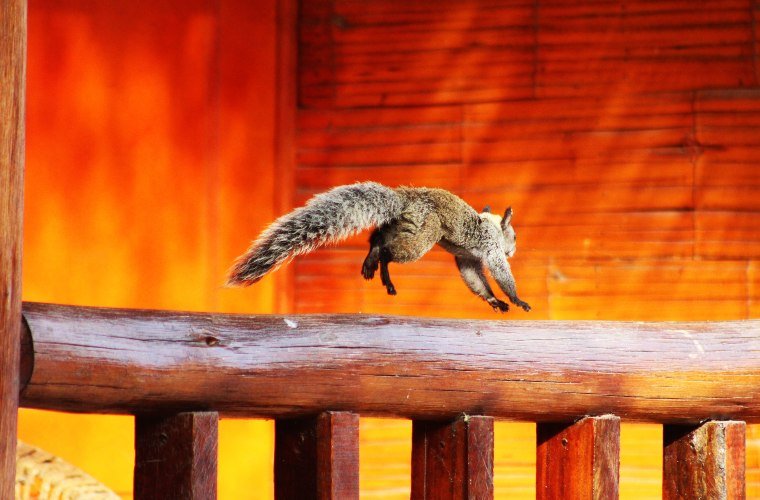Animal behaviorists have long resisted ascribing specific personality traits to non-human species, primarily because individual traits like sociability or compassion have long been considered exclusively human in nature. This trend has undergone a significant change in recent years, with researchers observing and reporting on individual personality traits across various animal species, including birds, dogs, cats, and even fish.
Now, a study of golden-mountain ground squirrels by researchers from the University of California, Davis, which was published in the peer-reviewed journal Animal Behavior, has not only pinpointed four specific personality traits in these furry little critters, namely boldness, aggressiveness, activity level, and sociability but has isolated specific traits or combinations of traits that can have a significant effect on the animal’s success and risk of early death, as well as long term survival.
“Bolder, more aggressive squirrels may find more food or defend a larger territory,” the press release announcing the study states, highlighting just one example, “but their risky behavior may also make them vulnerable to predation or accidents.”
Background: That Squirrel Has Serious Personality
Few, if any, of the over 200 squirrel species around the globe have been studied as closely as the golden-mountain ground squirrel, a species common across the western United States and Canada.
Since its founding over 30 years ago by Professor Dirk Van Vuren from the UC Davis Department of Wildlife, Fish and Conservation Biology, the Rocky Mountain Biological Laboratory (RMBL) in Gothic Colorado has led that effort, conducting a range of studies of these peculiar yet fascinating little creatures.
The lead author on this latest study and one of Professor Van Vuren’s protégé’s, Jaclyn Aliperti, conducted her research into golden-mountain ground squirrel behavior while simultaneously earning a Ph.D. in ecology at UC Davis. And accordingly, it was her unique access to the wealth of previous research material at RMBL that afforded Aliperti a rare opportunity to zero in on these animals’ specific personality traits in hopes of quantifying the benefits and risks associated with each individual trait or combination of traits.
Of course, Aliperti makes sure to point out that there is no established Meyers-Briggs (a popular human personality test) for animals. However, she still hoped that the decades of research done at the lab combined with a fresh set of “personality” tests she and her team planned to run might shed some light on what, if any, personality traits the animals might exhibit, and if those traits conveyed either benefits or risks for their long term survival.
Analysis: Surplus Chutzpah Matters
After combing through previous research to set a behavioral baseline, the UC Davis team focused their own experimentation on four specific personality tests.
These include:
The “novel environment” test – which involved placing an individual squirrel in an enclosed box with gridded lines and holes, something they would be unlikely to experience in nature.
The “mirror” test involved presenting the squirrels with a mirror image of themselves (the study notes that none of the animals recognized the image as themselves).
The “flight initiative” test involved researchers approaching squirrels in the wild to measure how long the animals waited before running away.
And the “behavior-in-trap” test had researchers capture squirrels (unharmed) and observe their behavior briefly before safely releasing them.
After conducting these experiments, Aliperti and her team identified four specific personality traits in the test subjects: Boldness, Aggressiveness, Activity Level, and Sociability. Each observed squirrel was scored on these four particular traits, giving each individual animal a unique personality profile. By observing these profiled animals in their natural habitat, the team found that certain traits or combinations of traits indeed seemed to convey survival advantages, while in one particular case also appeared to add to the risk of early death by accident or predation.
For instance, squirrels labeled as “bold” had larger territories than their less bold companions. Squirrels that were both “bold” and “active” moved faster than the others, while squirrels that were “bold,” “active,” and also “aggressive” had greater access to higher, riskier perches such as high branches or tall rocks.
“Perch access,” the study notes, “is important because it can provide a better vantage point for seeing and evading predators.”
Conversely, the study found that although having a bolder, more aggressive disposition offered some squirrels the surplus chutzpah needed to venture to these riskier perches than their meeker counterparts, such increased risks also meant that bolder, more active, more aggressive animals faced an increased risk of early death from either a fatal fall or greater exposure to predators.
As far as long-term life expectancy, the research paper concluded that “within this asocial species, individuals that tend to be relatively more social seem to have an advantage.” Specifically, the study determined that “being more social could save an individual’s life” and that “such personality differences can influence a squirrel’s ability to survive and reproduce, which could scale up to the population or community level.”


Outlook: Even Among Squirrels, The Nice One’s Finish First
Aliperti and her co-authors emphasized that the golden-mantled ground squirrel is under no conservation threat but believe their study’s findings still show how gaining a better understanding of an animal’s personality can be a critical component for wildlife conservation.
“Accounting for personality in wildlife management may be especially important when predicting wildlife responses to new conditions, such as changes or destruction of habitat due to human activity,” said Aliperti. “This [study] adds to the small but growing number of studies showing that individuals matter.”
Perhaps it is unsurprising to human behaviorists that the squirrels that took more risks and were more aggressive in taking those risks reaped more benefits than their cohorts while also facing a higher chance of early death from accident or predation. However, the UC Davis study also revealed that those who got along well with others exhibited the best overall chance for long-term survival, at least among golden-mountain ground squirrels. So maybe there is one more lesson to be learned from this study after all.
Follow and connect with author Christopher Plain on Twitter: @plain_fiction

